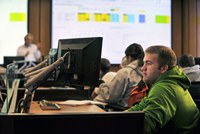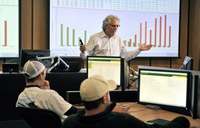NDSU Commodity Trading Laboratory Opens
(Click an image below to view a high-resolution image that can be downloaded)
An exciting new era of education has begun in the NDSU Department of Agribusiness and Applied Economics. The much-anticipated Commodity Trading Laboratory is completed.
The trading facility features the latest and best in technology, where students and researchers can analyze commodity markets and learn the fast-paced activity of risk management and trading.
“The Commodity Trading Lab has emerged to be state-of-the-art, both in technology and design. It will provide a very positive environment for teaching students with interests in commodity marketing, and is the first of its kind that specializes in agricultural commodities,” says William Wilson, university distinguished professor. “NDSU has a long tradition of training future leaders in this industry and the CTL will allow this to continue and grow. It will ultimately provide better training and exposure to marketing technology that is now the standard in these industries. It has a multitude of uses and has the potential to be used in other programs, including portfolio and finance courses in the College of Business.”
Located on the first floor of Richard H. Barry Hall, the trading room has 32 workstations and can be expanded to 48 seats.
Using dynamic linkages, students can produce spreadsheet analysis using many sources of information. Anything on a monitored screen can be linked to another screen, and the instant a number or order changes anywhere, it automatically updates the spreadsheet statistics, a system in tune with the immediate and constantly changing realm of international commodity trading.
Funding for the facility has come from many sources. The North Dakota Agricultural Experiment Station, NDSU Office of the Provost and NDSU Technology Fee Advisory Committee supplied seed money. Major agribusiness companies provided various forms of finan¬cial support, including ADM, CHS, Gavilon, The Rice Trader and George M. Schuler III of Minn-Kota Ag Products Inc. State com¬modity organizations also provided funds, including the North Dakota Corn Council, North Dakota Soybean Council, North Dakota Wheat Commission and Northern Crops Institute.
“It’s a true partnership between the university and industry to do a better job of teaching,” Wilson said.
NDSU Agriculture Communication – Oct. 18, 2012
| Source: | William Wilson, (701) 231-7472, william.wilson@ndsu.edu |
|---|---|
| Editor: | Steve Bergeson, (701) 231- 6101, steven.bergeson@ndsu.edu |




